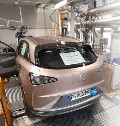06.10.2021
3 minutes of reading
IFPEN researchers are focusing their efforts on ECH2, an ambitious project led by Vitesco Technologies. The aim is to improve electronic control systems for hydrogen vehicles and facilitate the large-scale deployment of fuel cells by reducing their cost and increasing their life span.
 The hydrogen fuel cell (HFC) is set to play a more prominent role in decarbonising transport. It is considered to be a highly promising technology for heavy transport (trucks, buses), rail, maritime and aviation. However, to make this transition, substantial progress still has to be made to increase the lifetime of HFCs and lower their cost.
The hydrogen fuel cell (HFC) is set to play a more prominent role in decarbonising transport. It is considered to be a highly promising technology for heavy transport (trucks, buses), rail, maritime and aviation. However, to make this transition, substantial progress still has to be made to increase the lifetime of HFCs and lower their cost.
IFPEN’s expertise in the development of control algorithms
Against this background, the “Electronic Control for Hydrogen Vehicles” (ECH2) project led by Vitesco Technologies was launched with the support of two research institutes: IFPEN through its IFPEN Transports Energie Carnot Institute and the Laplace laboratory; and two industrial players, Siemens Digital Industries Software and ALSTOM Hydrogène (HELION Hydrogen Power). ECH2 was selected by the French steering committee for automobile research and mobility (CORAM) in July 2021 as part of the French government’s recovery plan.
IFPEN will take advantage of its expertise in advanced control of complex systems, numerical modelling and analysis of the environmental impact of products and services. IFPEN’s teams will focus on developing rugged control algorithms with all the features and functions required for these systems to work perfectly.
The applications envisioned by the ECH2 project involve both heavy freight vehicles and light commercial vehicles.
ECH2 is aiming at lower energy consumption and reduced costs for hydogen fuel cells
By adopting a modular approach to HFCs, with a deeper and broader understanding of the aging process of these fuel cells, as well as the development of predictive, optimal and adaptive control laws, the ECH2 project aims to reduce energy consumption and limit the cost of these systems.







